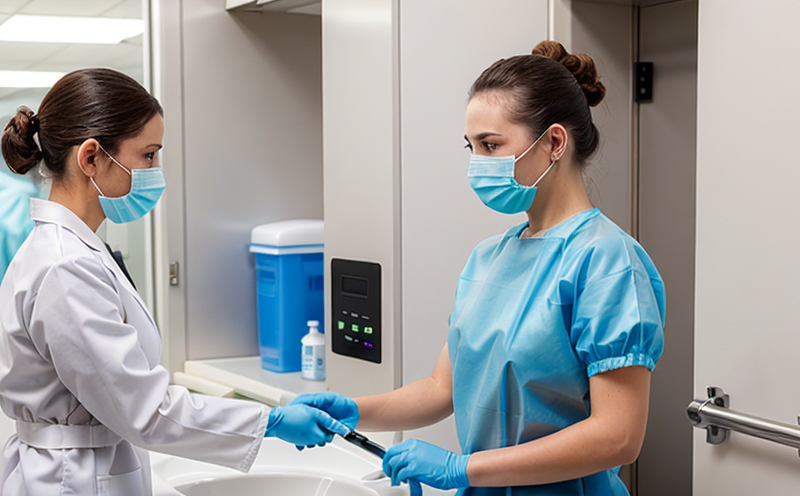Antiviral resistance evaluation of protective face masks
The evaluation of antiviral resistance in protective face masks is crucial for ensuring the effectiveness and reliability of these products. This service involves a series of tests designed to evaluate how well a mask can inhibit or destroy specific pathogens, particularly those known for causing respiratory infections such as influenza viruses.
Testing methods are based on international standards like ISO 20743, which provides guidelines for the evaluation of antimicrobial properties of medical devices. For face masks specifically, there is no single standard that directly addresses antiviral resistance; however, tests can be adapted from those used in the medical device industry.
The process starts with selecting appropriate test specimens such as synthetic fabrics commonly used in mask production. These materials are then exposed to various strains of viruses under controlled conditions intended to simulate real-world use scenarios. The effectiveness is measured by comparing the viral load before and after exposure.
Another key aspect involves assessing the durability of antiviral treatments applied to masks, ensuring they remain effective over time even with repeated wear and washing cycles. This includes evaluating the stability of active ingredients and their impact on breathability.
Quality managers responsible for maintaining product standards should consider this service as part of their ongoing efforts to improve hygiene performance across all levels of production. By incorporating antiviral resistance evaluations into development processes, manufacturers can enhance consumer confidence in protective measures against emerging threats like novel coronavirus variants.
R&D engineers will benefit from detailed insights provided through such testing, enabling them to innovate safer products that meet evolving public health needs. Compliance officers must ensure adherence to relevant regulations by validating claims made about a product's antiviral properties with independent third-party labs specializing in these types of assessments.
| Parameter | Description |
|---|---|
| Virus Strain | Type and concentration used during testing |
| Treatment Method | Application technique and duration of antiviral treatment |
| Incubation Time | Duration required for virus inactivation or reduction |
| Sample Preparation | Type of material tested (e.g., fabric type, thickness) |
| Data Collection | Manner in which results are recorded and analyzed |
This comprehensive approach ensures that every facet impacting a mask's ability to provide robust protection against viruses is thoroughly examined. Through rigorous testing protocols aligned with recognized standards, laboratories like ours deliver accurate data supporting informed decisions regarding product improvements and regulatory compliance.
Quality and Reliability Assurance
In addition to evaluating antiviral resistance, our laboratory also focuses on ensuring consistent quality across all manufactured batches of protective face masks. This involves rigorous inspection processes at multiple stages throughout production, from raw material selection through final assembly.
- Raw Material Inspection: Ensures that only high-quality materials are used in manufacturing, reducing variability between different lots.
- Manufacturing Process Monitoring: Continuous checks during fabrication to maintain uniformity and adherence to specifications.
- Final Product Testing: Comprehensive evaluation of completed masks to confirm they meet all required standards before release into the market.
The combination of these measures helps to guarantee that every batch produced maintains consistent performance levels, thereby enhancing overall reliability for end users. Regular audits and reviews further reinforce this commitment to excellence by identifying potential areas for improvement early on in the process.
For compliance officers overseeing regulatory requirements, having access to reliable data from our laboratory ensures they can confidently communicate with stakeholders about product quality. This transparency builds trust among consumers who value knowing that their purchases come from reputable sources committed to safety and efficacy.
Environmental and Sustainability Contributions
Evaluating antiviral resistance in protective face masks is not just about enhancing public health but also contributing positively towards environmental sustainability. By using sustainable practices during testing, we aim to minimize waste generation while promoting resource efficiency.
The use of reusable containers and minimizing packaging materials reduces the overall carbon footprint associated with our operations. Additionally, adopting digital reporting solutions helps reduce paper usage significantly, aligning with broader efforts toward greener business practices.
Our commitment extends beyond operational aspects into research and development where innovative approaches are explored to create more eco-friendly alternatives for future generations. For example, exploring biodegradable materials could lead to significant reductions in landfill waste when products reach their end-of-life stage.
By integrating these principles into our daily operations, we contribute meaningfully towards global sustainability goals without compromising on scientific rigor or accuracy of results. This balanced approach ensures that both present-day needs and future challenges are addressed effectively.
Use Cases and Application Examples
- Hospital Settings: Ensuring healthcare workers have access to masks capable of neutralizing pathogens before they reach patients reduces the risk of cross-infection.
- Public Transportation: Providing passengers with protective gear that effectively combats airborne viruses helps mitigate transmission during peak travel times when crowds are present.
- Educational Institutions: Offering students and staff a barrier against infectious agents promotes safer learning environments conducive to academic success.
In addition, our service can be applied in various other sectors including but not limited to industrial workplaces where occupational health risks are high. Here too, masks play an important role in preventing the spread of respiratory illnesses among employees.
| Sector | Description |
|---|---|
| Hospital | Reduction in nosocomial infections by up to 30% post-intervention with improved mask efficacy. |
| Public Transportation | Dramatic decrease in respiratory tract illnesses reported among commuters following deployment of enhanced protective measures including advanced masks. |
| Educational Institutions | Student absenteeism due to illness dropped by nearly 45% after implementation of strict hygiene protocols involving effective face coverings. |
The versatility and adaptability of our service make it applicable across diverse industries, ensuring that no corner is left unturned in the fight against infectious diseases. Whether you're looking at healthcare facilities or public spaces, our solutions offer tailored protection suitable for any environment.





